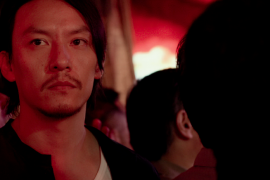Breaking away from the triteness that has come to define the vampire genre, but not quite far enough away to alienate the tweens who cheer on its formulaic simplicity – Jim Jarmusch strikes a much sought-after balance between the vampires of yore (think The Hunger) and the sex-symbolic bloodsuckers of today’s young-adult-centric fare.
Director:Jim Jarmusch. 123 mins.
Cannes debutant Only Lovers Left Alive lands smack at that golden mean, straddling the current overflow of toothy dreamboats at a safe auteurist distance. Jarmusch sates our thirst for ageless cinema and love affairs bestriding time itself, while enlisting Tilda Swinton and, to a greater, fanatical degree, Tom Hiddleston to pull in the younger audience. They play Eva and Adam, two centuries-old vampires who, while not explicitly portrayed as the vampiric counterparts to their original human namesakes, could easily be seen as epitomizing the functional relationship in the realm of dysfunctional vampires. Interestingly enough, glaring references like these are thick on the ground in Jarmusch’s dialogue – from Einstein to Shakespeare and Byron, the name-dropping might number in the dozens – and their pungent flavor underpins it with a hefty dose of self-addressed irony, leaving us with a confusing aftertaste. Is Jarmusch ultimately just poking fun at the spell cinema’s stock vampires are keeping us under?
The two protagonists, one wiry frame and matted mane apiece, are engaged in an on-again, off-again routine where, unfazed by the passage of time, they’ve been coming together and drifting apart, geographically,without the slightest bit of emotional distance cropping up between them. We meet them separately, at a time when their roads have taken them to opposite points on the map, Tangier and Detroit, respectively, with opposite results. None of them actually lives among “the zombies,” as Adam dubs the humans, but Eva is happily au fait with the progress of human affairs, and equally happy to entertain herself, over a glass of primo blood, with fellow old-timer Christopher Marlowe (John Hurt), while Adam’s loner life is taking a heavier toll on him.
A maladjusted back number with one foot steadfastly planted in the past, his home a heady, hoarder’s blend of bric-a-brac and steampunk, and doubling as a sound- and outsider-proof padded music studio, Adam collects and plays old guitars, dug up by his human friend Ian (Anton Yelchin), Adam’s only connection to the outside world.This provider of curios – and, as the only naïve character in the bunch, of accurately-timed comedy –is unaware that his latest find, commissioned by Adam, speaks of a worrying downswing in his friend’s general bad mood… This is where Eva comes in,all a balmy, nurturing breeze, to smooth away her lover’s dark wrinkles of – as it turns out, recurring – ennui.
It’s her mere presence that allays Adam’s world-weariness, and the lens lingers, to dazzling effect, on their reunion, or along the Detroit streets that, blissfully devoid of “zombies,”pack a delightful trivia punch as Jack White’s old stomping ground. Jarmusch never having been one to push the pedal too close to the metal,his film sways artistically, not from one plot point to another, but rather between opulent nightscapes set against baroque-reminiscent soundscapes (curated by Jozef van Wissem).
The arrival of Eva’s saucy babe of a baby sister Ava (Mia Wasikowska) does its part to upset the applecart, but her brattish, irreverent ways ultimately don’t add up to much of a gearshift. Amounting to a short-lived flash in the pan, her intrusion put me in mind of another, lesser, undead treat, Xan Cassavetes’ Kiss of the Damned, that was hailed last year as a worthy enough, though certainly flawed, indie feat, and whose plot also involved a havoc-wreaking sister. That particular wild card met an untimely end, in keeping with the rules and tropes of that, and most, vampire romps – which don’t apply to Jarmusch’s own riff, a slow-burning love story that hinges on its accoutrements (dreamy imagery, hypnotic slowmos, eccentric angles and lavish costumes) for substance.
To delve underneath it all is to reach the core of the film, telegraphed by the title – here lies the unchanging couple, these two god-like people whose clothes, habits and vernacular, a patchwork jumbled from different ages, place them outside any age. Together since time immemorial, even when they were apart, linked through their shared history and many, many lifetimes of memories, their relationship evokes a co-dependency even us humans can recognize or empathize with, giving off a whiff of predictability and mutual, all but telepathic understanding, which presumably would be the result of tacking hundreds of years onto your grandparents’ marriage.
Even without resorting to many outside scenes to frame these two recluses, Jarmusch manages to impress a patina of realism on their existence: these are not addiction-ridden vampires, they revel in the blood they ingest, ritualistically, always out of the daintiest of glasses, but they’re not consumed by their need of it to the point that they’d be forced out of hiding to retrieve it. And, in this day and age, when everyone from reenactors to hipsters pays tribute to times gone by, Eva and Adam wouldn’t look amiss.Radiating old nobility through every pore, their statuesque, outer-worldly good looks constantly anchoring the camera, Hiddleston and Swinton gracefully tread the thin line between lordly and hammy, with nary a misstep toward the latter.
It’s anybody’s guess whether, without their star power, the director’s penchant for long takes and slowly unwinding plots – some, like this one, skimping on twists and lacking a climax – could have resulted in as popular a flick, but, either way, it marks a turning point in the art-house fare, and makes for an example that others might follow. This decidedly fresh, genre-busting take on a type of story that one assumes will never go out of style at the movies, comes out of left field from a 60-year-old director who’s passed the point where he’d need to prove his command of the craft – but who, nonetheless, does prove that a filmmaker of his caliber can embrace the trends dictated by the popcorn crowds and still make powerful, relevant art in the process.







Wow, what a great review. The best one I’ve read for this movie so far.